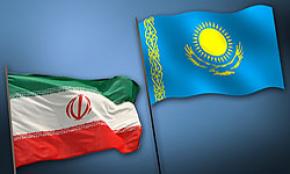ID :
179034
Sat, 04/30/2011 - 15:08
Auther :
Shortlink :
https://www.oananews.org//node/179034
The shortlink copeid
Iran, Kazakhstan Urge Regional Efforts in War on Drugs, Terrorism

TEHRAN,APRIL 30 (FNA)- Iranian and Kazakh officials in a meeting in Astana underlined the need for the regional countries to make concerted efforts in the war on drug-trafficking and terrorism.
During the meeting held on the sidelines of a meeting of the interior ministers of the Shanghai Cooperation Organization (SCO) in Astana on Friday evening, Iranian Deputy Interior Minister for Security and Law Enforcement Affairs Ali Abdollahi and Kazakh Interior Minister Kalmukhanbet Kasymov reiterated the significance of mutual and regional cooperation in the campaign against drugs and terrorism.
Abdollahi noted the necessary measures for the confrontation against terrorism and organized crimes in the region, and underlined that rapid action should be taken to block both financial backups for terrorist groups and promotion of extremist thoughts.
"Establishment of joint commissions in Iran and Kazakhstan's interior ministries will pave the ground for security cooperation between the two countries," Abdollahi noted.
Kasymov, for his part, asked for the further strengthening of the two sides' cooperation in the confrontation against terrorism and drug-trafficking.
Interior and public security ministers of the SCO member states held their second meeting in Astana on Friday, pledging for closer cooperation in law enforcement and security.
The meeting, hosted by Kazakh Interior Minister Kalmukhanbet Kasymov, gathered Chinese Public Security Minister Meng Jianzhu, interior ministers from Russia, Kyrgyzstan, Uzbekistan and a deputy interior minister from Tajikistan.
The Shanghai Cooperation Organization is an intergovernmental organization which was founded in 2001 in Shanghai, China, by the heads of states of China, Kazakhstan, Kyrgyzstan, Russia, Tajikistan and Uzbekistan.
Iran currently holds an observer status in the group and applied for full membership in a request filed on March 24, 2008.
SCO member governments include China, Kazakhstan, Kyrgyzstan, Russia, Tajikistan and Uzbekistan, as well as four formally designated observer countries, namely India, Iran, Mongolia, and Pakistan.
Iran lies on a major drug route between Afghanistan and Europe as well as the Persian Gulf states. Since the 1979 Islamic Revolution, the Iranian police have lost more than 3700 of their personnel in the country's combat against narcotics.
Eastern Iran borders Afghanistan, which is the world's number one opium and drug producer. Iran's geographical position has made the country a favorite transit corridor for drug traffickers who intend to smuggle their cargoes from Afghanistan to drug dealers in Europe.
Each year, the Iranian government spends hundreds of millions of dollars erecting barriers along the borders with Pakistan and Afghanistan and pumping resources into checkpoints.
Afghanistan continues to account for 90 percent of the world's illicit opium and heroin production, the UN drugs monitoring body said in its 2010 report.
According to UN statistics, Afghanistan produced only 185 tons of opium per year under the Taliban. Since the US-led invasion in 2001, drug production has increased to 3,400 tons annually.
The poppy production and drug business in Afghanistan has come at a heavy cost for Iran.
With a 900-kilometer (560-mile) common border with Afghanistan, Iran has been used as the main conduit for smuggling Afghan drugs to dealers in Europe.
During the meeting held on the sidelines of a meeting of the interior ministers of the Shanghai Cooperation Organization (SCO) in Astana on Friday evening, Iranian Deputy Interior Minister for Security and Law Enforcement Affairs Ali Abdollahi and Kazakh Interior Minister Kalmukhanbet Kasymov reiterated the significance of mutual and regional cooperation in the campaign against drugs and terrorism.
Abdollahi noted the necessary measures for the confrontation against terrorism and organized crimes in the region, and underlined that rapid action should be taken to block both financial backups for terrorist groups and promotion of extremist thoughts.
"Establishment of joint commissions in Iran and Kazakhstan's interior ministries will pave the ground for security cooperation between the two countries," Abdollahi noted.
Kasymov, for his part, asked for the further strengthening of the two sides' cooperation in the confrontation against terrorism and drug-trafficking.
Interior and public security ministers of the SCO member states held their second meeting in Astana on Friday, pledging for closer cooperation in law enforcement and security.
The meeting, hosted by Kazakh Interior Minister Kalmukhanbet Kasymov, gathered Chinese Public Security Minister Meng Jianzhu, interior ministers from Russia, Kyrgyzstan, Uzbekistan and a deputy interior minister from Tajikistan.
The Shanghai Cooperation Organization is an intergovernmental organization which was founded in 2001 in Shanghai, China, by the heads of states of China, Kazakhstan, Kyrgyzstan, Russia, Tajikistan and Uzbekistan.
Iran currently holds an observer status in the group and applied for full membership in a request filed on March 24, 2008.
SCO member governments include China, Kazakhstan, Kyrgyzstan, Russia, Tajikistan and Uzbekistan, as well as four formally designated observer countries, namely India, Iran, Mongolia, and Pakistan.
Iran lies on a major drug route between Afghanistan and Europe as well as the Persian Gulf states. Since the 1979 Islamic Revolution, the Iranian police have lost more than 3700 of their personnel in the country's combat against narcotics.
Eastern Iran borders Afghanistan, which is the world's number one opium and drug producer. Iran's geographical position has made the country a favorite transit corridor for drug traffickers who intend to smuggle their cargoes from Afghanistan to drug dealers in Europe.
Each year, the Iranian government spends hundreds of millions of dollars erecting barriers along the borders with Pakistan and Afghanistan and pumping resources into checkpoints.
Afghanistan continues to account for 90 percent of the world's illicit opium and heroin production, the UN drugs monitoring body said in its 2010 report.
According to UN statistics, Afghanistan produced only 185 tons of opium per year under the Taliban. Since the US-led invasion in 2001, drug production has increased to 3,400 tons annually.
The poppy production and drug business in Afghanistan has come at a heavy cost for Iran.
With a 900-kilometer (560-mile) common border with Afghanistan, Iran has been used as the main conduit for smuggling Afghan drugs to dealers in Europe.





